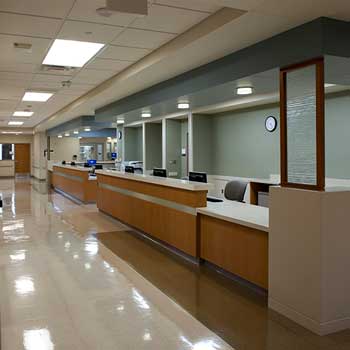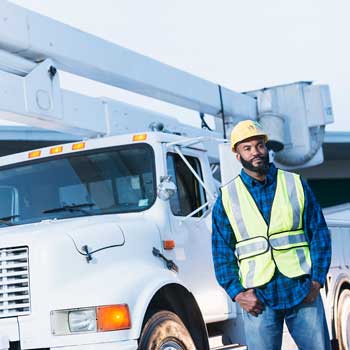“Look for the helpers. You will always find people who are helping.”
This famous piece of advice shared by the mother of Fred Rogers is often used as a beacon of hope and encouragement in the face of scary situations.
Whether it be a health pandemic, natural disaster or national tragedy, the next crisis is never a case of if; only when. But in the face of an emergency, there are always those who step up to help.
In many ways, the construction industry has a big role in supporting communities in these tough times. Craft professionals of all kinds lend a hand in helping to prepare for and respond to any scenario. Here are a few ways that show construction cares in a crisis.

In any crisis situation, the health and well-being of a society is critically tied to the placement and upkeep of certain essential services.
Consider the importance of these services and utilities in everyday life, as well as in a crisis:
It seems like everything we use in day-to-day life requires power, from the lights in our home to the battery in our cell phones.
While many things that require electricity may fall more into comfort and convenience (such as a television or video game console), electricity is absolutely a necessity for other functions, such as refrigeration for food and the operation of life-saving medical equipment.
Plumbing systems serve two important functions that impact our lives: Transporting clean water to us while removing sewage.
Water is of course one of the top necessities for basic human survival, and plumbing makes sure that water is readily available and also safe to drink.
Processing waste water is also a key to maintaining a healthy society. This step in sanitization limits human exposure to harmful bacteria and illness that can be spread through sewage – in fact, contaminated water is often cited as a major cause of the spread of historic epidemics such as the Plague. Sanitation is considered to be the greatest medical advancement since the mid-1800s, and innovations in plumbing play a major role.
Modern air conditioning is certainly a key in comfort, but it can also be critical to survival, especially in extremely hot or cold temperatures.
Hypothermia is a threat in the cold northern winters, while heat stroke and dehydration are among the dangers that come with sweltering summers. Prolonged exposure won’t just give you the shivers or make you sweaty; it could be lethal. Proper heating and cooling systems are needed.
Ventilation is also a major health benefit of HVAC systems. Air filters and circulation help to improve air quality, removing airborne microbes, dust and other contaminants. These systems are especially important in locations where many different people congregate, such as hospitals and office buildings.
With these and other utilities provided by skilled craft professionals, we get to enjoy many of our basic and advanced comforts of modern life. But the importance of these things becomes even more elevated amid a crisis situation.
In the case of a disaster, the first responders are the heroes who go into the affected area, sometimes while the situation is still dangerous, to help.
The wave of first responders in a crisis often includes paramedics, fire and rescue teams and the police. While not thought of as often, some types of craft professionals often take on first responder roles as well.
Especially in the case of a natural disaster, such as a hurricane, tornado or earthquake, the destruction caused can interrupt many of the essential services listed above. Power lines can be toppled, transformers can blow out, pipes and fuel lines can become compromised.
Restoring these services in a timely manner is critical to minimizing the impact of these crises. The sooner things are back up and running, the sooner medical professionals can offer full healthcare, the sooner important communications can be widely distributed, and the sooner the next wave of recovery can begin.
Along with restoring utilities, construction first responders help prevent potential injury or sickness caused by damage. For example, downed power lines can be extremely dangerous – and often this danger is silent, with no sparks or other obvious warning. Other first responders and civilians alike can be electrocuted unless damaged systems are grounded and repaired by trained linemen.
If you live in Florida or in or near other states commonly affected by hurricanes, you may have seen long convoys of utility trucks en route to areas impacted by the storms, or have seen fleets of these trucks parked in large gatherings prepared and waiting to deploy. When a crisis hits, volunteers from across the region mobilize and come to help.
So the next time you think about first responders, don’t forget about the power line workers, electricians, plumbers, pipefitters, equipment operators and other craft professionals who lend a hand when it’s most needed.

When faced with a crisis, one of the priorities for a society is infrastructure.
Having the supply lines, transportation routes and operational facilities needed to face the crisis often comes back to the construction industry to build them in the first place and then to maintain them or rebuild them as needed.
Every road, hospital, grocery store, power plant and factory has had construction craft professionals and their skills involved in its creation. In many ways, the whole economy itself starts with construction. Repairing and updating all these things through the years also involves craft skills, and so construction plays a very important role in being prepared for both normal and abnormal situations.
But in extreme cases, the basic infrastructure sometimes simply isn’t enough to handle a crisis. So in those cases, the industry once again springs into action to help.
For example, the U.S. Army Corps of Engineers – a group in the United States military that specialize in engineering and construction related to public works projects – has worked to erect temporary hospitals to assist in healthcare during the COVID-19 coronavirus pandemic. Construction companies and contractors are also working to speed up the timelines to complete in-progress hospitals and medical facilities that were planned before the coronavirus outbreak. Groups like the National Guard are converting places like convention centers, hotels and stadiums into treatment facilities or testing centers.
Working hard and fast – while still building to code and maintaining safety best practices – is something everyone should be able to appreciate during a crisis situation.
There are many selfless people who deserve thanks and gratitude during and after an emergency situation. The craft professionals of the construction industry are among those who offer their skills and lend a helping hand in the face of a crisis.
Want to share your story of how construction has responded to a crisis? Use #ConstructionCares on social media to talk about it.